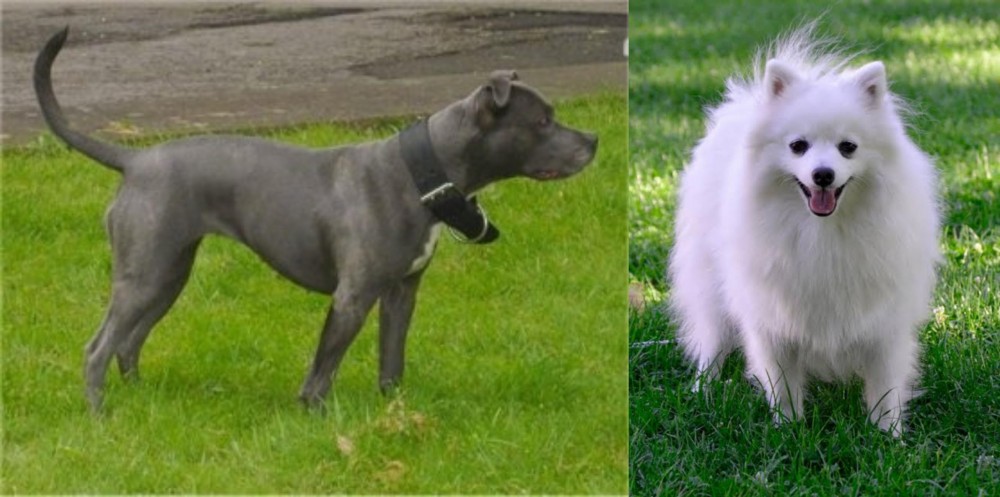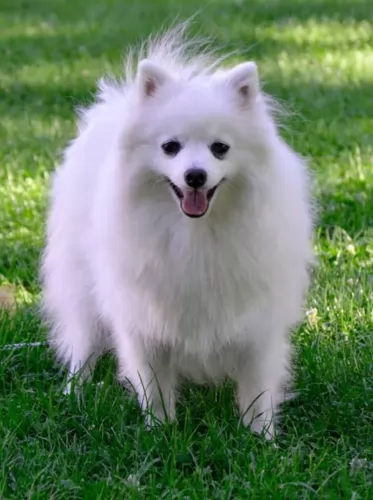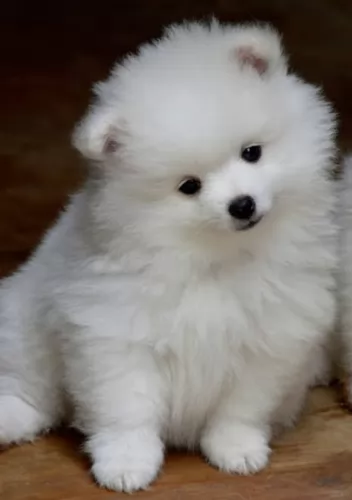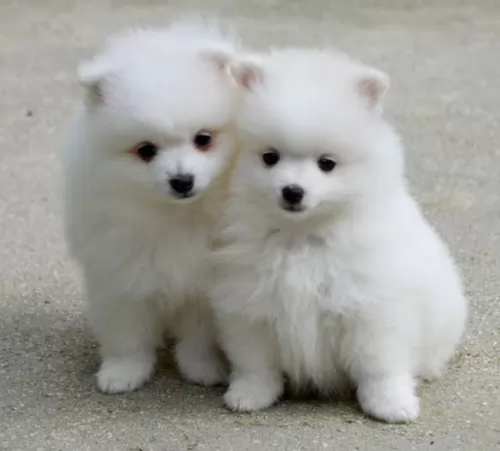 Petzlover
Petzlover Irish Bull Terrier is originated from United Kingdom but Volpino Italiano is originated from Italy. Irish Bull Terrier may grow 18 cm / 8 inches higher than Volpino Italiano. Irish Bull Terrier may weigh 6 kg / 14 pounds more than Volpino Italiano. Both Irish Bull Terrier and Volpino Italiano has same life span. Irish Bull Terrier may have more litter size than Volpino Italiano. Irish Bull Terrier requires Low Maintenance. But Volpino Italiano requires High Maintenance
Irish Bull Terrier is originated from United Kingdom but Volpino Italiano is originated from Italy. Irish Bull Terrier may grow 18 cm / 8 inches higher than Volpino Italiano. Irish Bull Terrier may weigh 6 kg / 14 pounds more than Volpino Italiano. Both Irish Bull Terrier and Volpino Italiano has same life span. Irish Bull Terrier may have more litter size than Volpino Italiano. Irish Bull Terrier requires Low Maintenance. But Volpino Italiano requires High Maintenance
 The Irish Bull Terrier is a variant of the Staffordshire Bull Terrier and is also known as the Irish Staffordshire Bull Terrie.
The Irish Bull Terrier is a variant of the Staffordshire Bull Terrier and is also known as the Irish Staffordshire Bull Terrie.
The dog isn’t particularly well known outside of Ireland and it is also unrecognized by any kennel clubs, although there are some dog organizations which recognize the Irish Staffordshire Bull Terrier and this includes the Dog Registry of America as well as the United National Kennel Club.
Although descended from the Irish Bulldog and the original Staffordshire Pit Terrier, the breed has also been influenced by other dog breeds such as the English White Terrier among others.
 This Italian bred dog is Spitz-type and very ancient. The Spitz breeds have been around since at least 4000BC. Archeologists have found remains that match the Spitz heritage of fox like heads, curly tails, erect small ears. In Greece in 400BC there were engravings of these dogs. Michelangelo painted the breed as he lived with one. In 1888, the Queen of England – Victoria – brought 6 back to England from Florence.
This Italian bred dog is Spitz-type and very ancient. The Spitz breeds have been around since at least 4000BC. Archeologists have found remains that match the Spitz heritage of fox like heads, curly tails, erect small ears. In Greece in 400BC there were engravings of these dogs. Michelangelo painted the breed as he lived with one. In 1888, the Queen of England – Victoria – brought 6 back to England from Florence.
The Italians have loved the Volpino for centuries. These little dogs that resemble the Pomeranian so much but existed much before them. It was very early in the history of the domesticated dog that the Volpino moved from north to south. The Italians called them Volpino because it means foxy dog. They also called them Lupino which means wolfy dog.
The breed was never seen outside of its home range in Italy until the 1880’s and it is still a rare breed. However since the 1980’s the breeders of the American Eskimo brought some from Italy to the US and claimed they were American Ekimo runts. They interbred the Volpino with the American Eskimo creating the toy and mini Eskimo.
The Volpino was a guard dog alerting the Mastiffs to the presence of intruders. The Mastiff would then respond to the intruder. The Volpino was also a popular companion animal due to their easy temperament and their high intelligence level. However they grew less popular and by 1965 there were only a few registered dogs left. There was an attempt to revive the breed in 1984 when dogs that still lived on farms were used as new stock. Even with this, they remain a rare breed and only about 4000 are alive throughout the world.
The Volpino have been denied AKC registration or stock registration as they are considered to be too much like the American Eskimo Dog. However they are recognized by the FCI, the UKC, the ENCI (Italian National Kennel Club), the North American Volpino Club, the Volpino Italiano Health and Genealogy Club and the Volpino Club of America.
 Bred essentially for dog fighting, the Irish Bull Terrier, known also as the Irish Staffie, is a medium sized dog which stands at roughly 43 to 48cm and weighs in at anything from 14kg to 18kg.
Bred essentially for dog fighting, the Irish Bull Terrier, known also as the Irish Staffie, is a medium sized dog which stands at roughly 43 to 48cm and weighs in at anything from 14kg to 18kg.
The dog is muscular, lean and strong with a strong jaw, deep chest, a broad head, short muzzle with round, brown eyes. The ears are half-erect and he has a long, straight tail. The coat of the dog is short and smooth and in different shades of red, fawn, black and brindle. Sometimes there are white markings.
The Irish Staffie has an aggressive temperament when it comes to fighting other dogs, but he loves being with a human family, being a social dog.
Those who have owned the dog say he is a courageous, confident, strong-willed, affectionate, loyal pet who is playful and loves getting up to mischief. He is intelligent too and can be easily trained and socialized, getting on well with children in the home.
This dog seems to have a constant grin on his face and he just loves life. He loves working hard and playing hard and even though he has a history of fighting, with people he is loving and devoted.
He is boisterous and better suited to a strong-minded, active family as he tends to be stubborn, wanting his own way. He can adapt well to life in the city or the country, but wherever he lives, he will require his owners to give him a good amount of exercise.
 The Volpino is about the same size as the Pomeranian and smaller than the American Eskimo Dog. They are a rare breed and they have a soft, thick coat and they can be red, white or champagne. With the pointed ears and muzzles, they do look like a fox. They have large thick tails curling over their back and they have double coats.
The Volpino is about the same size as the Pomeranian and smaller than the American Eskimo Dog. They are a rare breed and they have a soft, thick coat and they can be red, white or champagne. With the pointed ears and muzzles, they do look like a fox. They have large thick tails curling over their back and they have double coats.
 Lots of contact from his human family is what your Irish Bull Terrier will want from you. He is a loving, social dog and close human contact as well as lots of good food and exercise is what he will require from you.
Lots of contact from his human family is what your Irish Bull Terrier will want from you. He is a loving, social dog and close human contact as well as lots of good food and exercise is what he will require from you.
With training and socialization he becomes an awesomely obedient pet, getting on well with adults and children in the home. He is such an entertaining, happy dog and once you've had an Irish Bull Terrier you will find your home empty without one.
 Looked after well, your Irish Bull Terrier can reach 14, 15 or 16 years of age. Just like with other dogs, he is prone to some common dog illnesses, of which eye illnesses can be one.
Looked after well, your Irish Bull Terrier can reach 14, 15 or 16 years of age. Just like with other dogs, he is prone to some common dog illnesses, of which eye illnesses can be one.
Production and drainage of fluid is supposed to be balanced in the eye, and Glaucoma comes about when this balance is disrupted. Symptoms include red eye, pain, increased tear production and corneal cloudiness. Your vet may recommend treatment that will decrease inflammation in the eye.
The lens of the eye is usually clear but sometimes it develops a cloudy cataract which blocks light from reaching the back of the eye. The result is poor vision and even blindness. Cataract surgery is available for dogs and your vet can advise you further.
 The Italian Volpino has better health than most dogs due to so much isolation for so many years. However they are susceptible to some diseases and genetic issues.
The Italian Volpino has better health than most dogs due to so much isolation for so many years. However they are susceptible to some diseases and genetic issues.
• PLL Primary Lens Luxation – Genetic mutation of the eye. Very painful and usually occurs between 4 and 8 years of age. Usually results in euthanasia.
• Patellar Luxation – moving knee cap – can result in lameness and/or arthritis.
 An Irish Staffordshire Bull Terrier isn't going to require you spending a lot of money on him in terms of grooming. He is a low maintenance dog and his short, smooth coat will only require a good brush once or twice a week as he isn't a heavy shedder.
An Irish Staffordshire Bull Terrier isn't going to require you spending a lot of money on him in terms of grooming. He is a low maintenance dog and his short, smooth coat will only require a good brush once or twice a week as he isn't a heavy shedder.
Brushing him has several advantages – he loves the attention you’re giving him, its a time to check on fleas and ticks and it is excellent conditioning therapy for his coat. A damp cloth can also be used to wipe him down, and this is far better than bathing him with a shampoo that could aggravate his skin.
Your Irish Bull Terrier is an energetic breed and he certainly won't do well in a home where the family leaves him to his own devices day after day in the back yard.
Social and energetic, your pet will want to join you with your daily walks and he finds a ball irresistible. As a responsible dog owner, you will need to see that he gets a fair quota of exercise otherwise you should rather settle for a less active breed.
It goes without saying that such an active dog will require a good diet so ensure he can remain happy and active. Always try and feed your pet the best quality food there is.
If its commercially manufactured food, make sure its high quality and isn’t packed with unwholesome fillers and preservatives. Your vet can always offer sound advice on this aspect.
Some homemade food such as cooked chicken, brown rice and vegetables added to his kibble will do him the world of good and if you can afford it, mix in some raw meat from time to time. Make sure he has access to fresh, cool water.